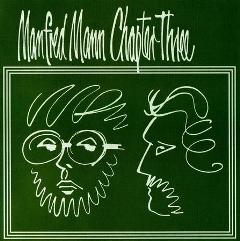Manfred Mann Chapter Three - Volume 1 (1969)
Manfred Mann Chapter Three - Volume 1 (1969)

1. Travelling Lady (5.48) 2. Snakeskin Garter (5:48) 3. Konekuf (5:47) 4. Sometimes (2:37) 5. Devil Woman (5:24) 6. Time (7:25) 7. One Way Glass (3:33) 8. Mister, You're A Better Man than I (5:10) 9. Ain't It Sad (1:57) 10. A Study In Inaccuracy (4:05) 11. Where Am I Going (2:36) + 12. Sometimes (mono) (2:22) 13. Mother (aka Traveling Lady) (5:20) 14. Devil Woman (single version) (5:23) 15. A Study in Inaccuracy (Alternative Version) (5:10) Bass [Fender], Guitar, Harp – Steve York Drums – Craig Collinge Flute [Alto] – Bernie Living Organ, Whistle [Police] – Manfred Mann Vocals, Piano – Mike Hugg
It's light years from the airy pop of "Do Wah Diddy Diddy," recorded by the hit-making first group formed by South African Manfred Mann and Mike Hugg in 1963. This is as much jazz as rock. There's hardly any guitar, but a swaggering horn section compensates. Imagine a darker, moodier Traffic with Mann manning the organ instead of Steve Winwood. Hugg's raspy vocals are featured on the first album recorded with the new band. The standout tracks are the album-opening "Travelling Lady" and "Time," but they are hardly the only strong ones. ---Mark Allan, AllMusic Review
Manfred Mann’s Chapter 3 was this band’s third lineup formed around late 1968/early 1969. Mann had taken in bassist Steve York from the legendary progressive psychedelic band East of Eden. It was the start of something new and fresh, a total departure from the blues-rock and psych pop lineups of the mid to late 60’s.
Each Manfred Mann lineup has at least one classic record on offer but Volume 1 is unique even within these ranks. Volume 1 was something that Mike Hugg and Mann had wanted to do for sometime but feared the possibility of a commercial failure. Hugg handles most of the lead vocals on a record that I’ve heard described by some as a darker version of Traffic circa 1969. The sound is very progressive, peppered with jazzy horns, keyboards/organ, a slow stoned ambience, creative arrangements and Hugg’s quite original although bizarre vocals. Mister You’re A Better Man Than I, the original version, finally makes an appearance, in a slow jazzy build up that’s a definite highlight. Totally different than the Yardbirds’ masterpiece of the mid 60’s, it’s still superb and worth your time.
Other songs like the brilliant Devil Woman fall in between the exotic and avant-garde with strange percussion, a demented Mike Hugg, sound effects, and soaring female backup vocals. Sometimes and One Way Glass are the most pop oriented of the bunch but are dreamy jazz inflected gems. I would have to give this album one of the highest possible ratings for early progressive rock (1969) because of the musicianship, originality, and overall downer mood. Chapter 3 released one other solid record in 1970 and supposedly have a shelved 3rd album awaiting release (it’s supposedly their best from what I have read)! --- therisingstorm.net
Pod koniec roku 1969 w sklepach ukazała się debiutancka płyta grupy, w gustownej zielonej okładce i z karykaturami członków zespołu. Wszyscy spodziewali się kolejnych przebojów, więc wyobrażam sobie, że przeciętny fan "Doo Wah Diddy" po wysłuchaniu pierwszych taktów "Volume One" zrejterował zygzakiem. Krzycząc z przerażenia.
To jest jazz. Zasadniczo rzecz biorąc do takeij szuflady można włożyć dokonania Manfred Mann Chapter Three. Hugg przesiadł się zza garów na pianinko i zaczął śpiewać. A głos Hugg ma bardzo specyficzny i o wyjątkowo nieprzyjemnej barwie (co świetnie pasowało do klimatu). Mann jak zwykle siedział za organami. Do tego dołożyć trzeba sekcję rytmiczną (bardziej rockową niż jazzową, to fakt) i dęciaki. Dużo dęciaków. Jeszcze dęciaki dodatkowo. I ZERO gitary. Tak, poza nielicznymi akustycznymi akcentami, elektryczna gitara jest na tym albumie nieobecna.
To niełatwa w odbiorze muzyka. Fragmenty bardzo melodyjne łamane są często nieprzyjemnym jazgotem. Mann i spółka jakby celowo uciekają od melodii ku demonicznemu klimatowi, ku specyficznej atmosferze, ku transowi, improwizacjom. Są tu szalone sola saksofonu, potężne partie sekcji dętej, długie, rozjazgotane sola na organach elektrycznych. Jest demoniczna kobieca wokaliza ("Devil Woman"). Jest kościelny chór wpleciony we free-jazzową improwizację ("A Study In Accuracy"). Jest fenomenalna, lodowata wręcz wersja "Mister You're Better Man Than I" który Mann skomponował parę lat wcześniej dla The Yardbirds. Potencjalna przyczyna zawału każdego z członków The Yardbirds. A z kolei w całkiem ślicznych quot;Sometimes" i "Ain't It Sad" klimat jest...canterburyjski. Tak grał zespół Caravan dwa-trzy lata później. Niesamowite, ale prawdziwe. "Time" fajnie wzbogacone jest partią harmonijki ustnej, ale to soczysty, mięsisty jazz z "bondowskimi" dęciakami. Z kolei natomiast dęciaki z "One Way Glass" dużo zawdzięczają beatlesowskiemu "Hey Jude" (swoją drogą to jedyny na płycie numer śpiewany przez Manna).
Taką muzykę Manfred Mann i Mike Hugg chcieli ponoć grać od samego początku. Interesował ich nowoczesny jazz i tylko przypadkowy zbieg okoliczności sprawił, że przez prawie 6 lat współtworzyli kopalnię przebojów pop. I chyba źle się stało, że nie poczekali jeszcze chwili z pokazaniem światu swojego prawdziwego oblicza, bo wyszło na to, że świat nie był gotowy na Manfreda Manna - awangardzistę, jazzmana, muzyka niekomercyjego. "Volume One" to bardzo odważny album. Zdecydowanie najodważniejszy w całej karierze Manna. Totalne odcięcie się od przeszłości, takie "albo mnie zaakceptujecie, albo nie - nie dbam o to, bo jestem szczery". No właśnie - czuć na tej płycie szczerość. Czuć serce w tym graniu, czuc duszę. Od pierwszego słuchania wiadomo, że to nie koniunkturalizm, tylko faktycznie tak panom w duszy grało. A że świat się nie poznał? Pieprzyć to, naprawdę. Liczy się tylko wspaniała muzyka. Tym bardziej, że dokonania Manfred Mann Chapter Three odkrywane po latach brzmią świeżo, inspirująco i wciąż bardzo odważnie. Taka muzyka nie ma szans się zestarzeć po prostu. ---Tarkus, artrock.pl
download (mp3 @320 kbs):
yandex mediafire uloz.to cloudmailru ge.tt
Last Updated (Monday, 25 June 2018 08:39)








